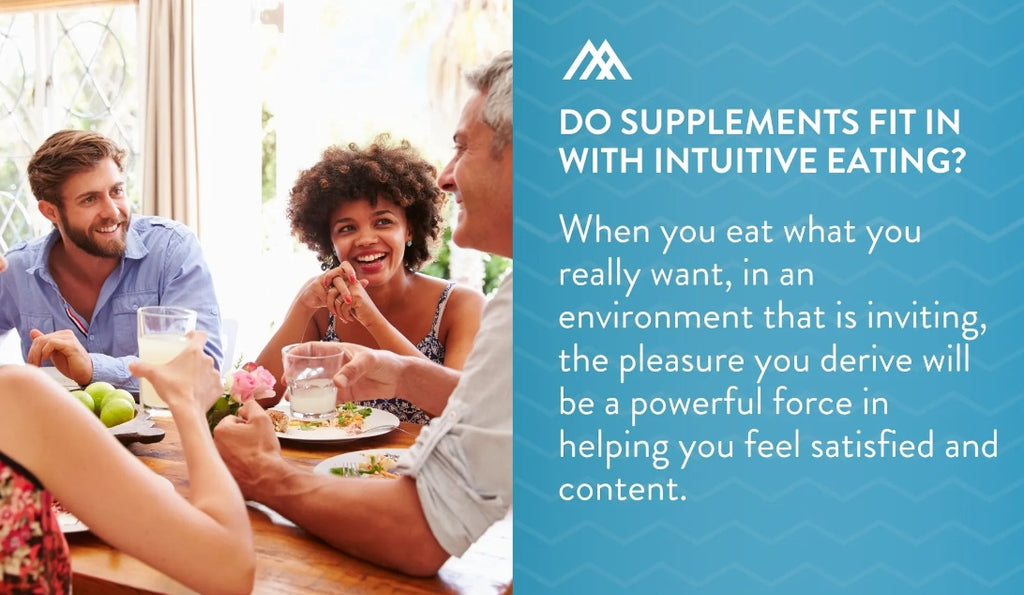Your Cart is Empty

November 16, 2020 7 min read
Take our quiz and find which supplements your body is craving.

The term intuitive eating and all of its principles were developed by Evelyn Tribole, RD, and Elyse Resch, RDN in the 1990s. Intuitive eating was born of a desire to reverse the damage that our diet culture has done to our view of food and eating and ultimately our individual relationships with food. Doctors Evelyn Tribole and Elyse Resch saw the number of eating disorders growing alongside a never-ending slue of diet fads. They saw their patients struggling through diets, only to gain the weight right back after they were done. Not only did the weight come back, but it also came with feelings of guilt, lower self-esteem, and a negative body image.
Personally, I remember being obsessed with gaining weight as a 12-year-old girl. Any time I'd visit a fast-food restaurant, I pressed my french fries between two napkins to get all the grease out before I ate them because I was scared to gain weight. This was before the prevalence of social media. Nowadays, it's hard to imagine how children and teens navigate their body image and self-worth among the constant barrage of social media influencers advertising weight-loss products and the many images of thinness, as well as the promotion of plastic surgery to custom build a body circulating through the media.

Dieting is unsustainable and exhausting and it often seems that the "finish line" keeps getting pushed further and further away. Intuitive eating flips this notion on its head. Intuitive eating doesn't prescribe a strict diet or a lengthy list of forbidden foods. In a nutshell, it teaches you that your body knows what it's doing and that you should honor and trust your body's internal cues to help guide your nutrition. Here are the 10 principles of intuitive eating to help ditch the diet mentality and shape a healthy relationship with food:



Intuitive eating is backed by hundreds of studies, but its benefits might not be what we're used to seeing. To reiterate, intuitive eating is not a diet, it is a tool to connect you with your body and to understand its cues to better control your eating habits and promote a more holistic well-being. Intuitive eating is not meant to produce weight loss or other short term benefits like the typical diet approach would, it is a long-term lifestyle change with long-term benefits. It has been found to have numerous psychological health benefits, including increased self-esteem, positive body image, and decreased depression and anxiety. This is mostly due to reshaping the eating experience and tuning you into your body's cues of hunger and fullness. For this reason, registered dietitians and certified intuitive eating counselors have found that it can be an effective tool for recovering from eating disorders.
The best way to become an intuitive eater is to work with a registered dietitian, nutritionist, or certified intuitive eating counselor. It can seem like a big leap to begin your own journey, and it can be hard to trust yourself and your body's cues at first. Many people worry that they'll go off the deep end and over-indulge in carbs or sweets and eat like it's their last supper. It's hard to ditch the diet mentality, so it's best to work with a guide at first. Together, you will be able to create a nutrition plan that helps you to fill in any gaps to make sure you are eating the foods you love while getting the nutrients your body needs. This is where some people choose to add in supplements.

The body is a powerful compass in filling your nutritional needs. This is to say, if you're suddenly craving a juicy steak, your body is probably telling you that it needs some more protein! Your food choices will guide the majority of your nutrition, but every individual has different nutritional needs based on their gender, genetics, age, hormones, activity levels, and their current eating habits as well. Guided by a nutritionist, you can use supplements to support your health while still embracing intuitive eating and removing the stress of hitting micros and macros with your daily diet.
For instance, vitamin C supplements can be used to keep your levels high without putting pressure on you to consume more citrus, tomatoes, etc. Collagen peptides can be used to provide you with protein to support your joints, hair, skin, and nails without having to fight your body's cravings and eat a bowl of bone broth soup every day. Those with specific dietary restrictions can also fill their nutritional needs via supplements without having to step outside of their limitations. For example, the first thing many of us think of when we think "omega-3" is fish oil but this poses a problem for vegans who still rely on omega-3s to keep their hearts and minds healthy. In this scenario, vegan omega-3 supplements can be taken to fill this gap without forcing the individual to consume fish. Similarly, marine collagen can be used in pescatarian diets to alleviate cravings without consuming beef or other protein-rich foods that are outside of their diets. Additionally, nutrients like glucosamine which cannot be found abundantly in food sources can be provided in supplement form.
Intuitive eating is becoming a popular tool to promote health at every size. Today, doctors Evelyn Tribole and Elyse Resch still have their own private practices and are continuing the push towards intuitive eating. In recent years, they've developed their own Intuitive Eating Workbook to help you along your journey to holistic health and hone your skills as an intuitive eater. If the traditional diet culture is all you've ever known, it can be difficult and even scary to embrace intuitive eating. Luckily, there are plenty of dieticians to help you along your way to ensure that you are embracing your body's cues while still acknowledging your individual nutrition.
Intuitive eating teaches you that your body knows best: Honor and trust your body's internal cues to help guide your nutrition.
It is necessary to find other ways to manage your emotions outside of food.
Intuitive eating has numerous psychological health benefits, including better self-esteem, positive body image, and decreased depression and anxiety.
Guided by a nutritionist, you can use supplements to support your health while still embracing intuitive eating.

March 20, 2025 8 min read
Discover the benefits of creatine for women with Amandean’s Creatine HCI. Improve strength, energy, recovery, and cognitive function with this high-absorption formula. Its advanced HCl form ensures easy digestion and no bloating, providing all the benefits without the drawbacks. Elevate your fitness journey and overall wellness with a supplement designed for women’s unique needs.

March 03, 2025 7 min read
Discover how Bryan Johnson, a tech entrepreneur turned biohacker, uses cutting-edge science and personalized genetic testing to revolutionize health and longevity. Learn how biohacking, from diet to mental health practices, can help you live longer and healthier, with practical strategies to optimize your well-being. Find out more about genetic testing, and ways to implement results into your wellness routine.

February 19, 2025 6 min read
Explore the remarkable health benefits of medicinal mushrooms like Lion’s Mane, Turkey Tail, Chaga, and Reishi. These superplants support immune function, reduce inflammation, and boost brain health. Learn about Amandean's Brain Health supplement, combining Lion’s Mane, Magtein, and Alpha-GPC for optimal cognitive performance.